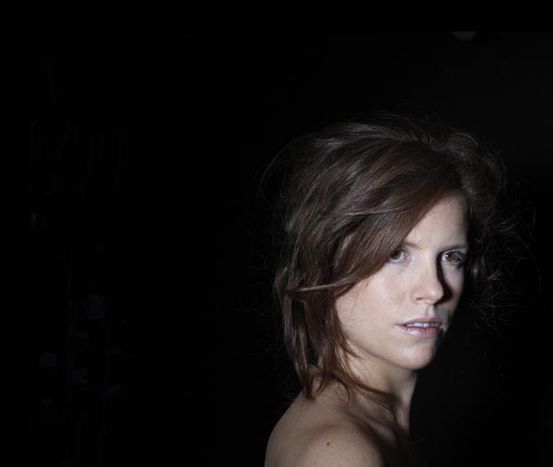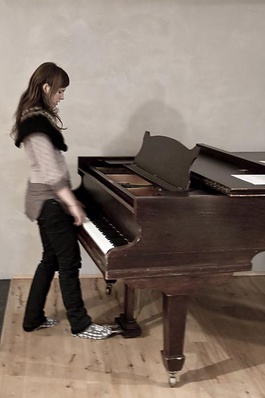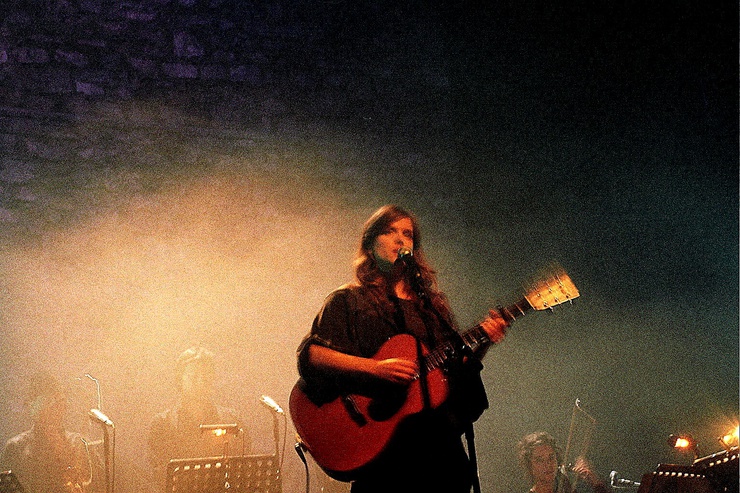
Olivia Pedroli: 'Icelanders are lucky to come from a country so far from everything'
Published on
Translation by:
Naomi RFrom her beginnings in Neuchâtel, Switzerland, Olivia’s talent led her to Reykjavik where she has bloomed under the mentorship of Bjôrk’s producer. Coming out of her trance, Olivia guides us through the mélange of folk, classical and experimental influences that make up her new album 'The Den'. Will you come in?
The hotel’s concierge hovers by the door, seemingly agitated by his displaced tables and the tangle of wires; perhaps he is too human to enter this lair of cellos, guitars and fun. Olivia Pedroli seems unsurprised by his disinterest. 'I didn’t want to make an album where you listen to one song after another. I wanted an album with it’s own sound, where I could guide people into another universe. That’s why I chose the title The Den. It’s the founding concept; it’s your choice whether you enter the den, because it’s not necessarily an easy thing to do, but once you’re there your imagination is free to evolve.'
Entering Olivia Pedroli's den
 Whilst the concierge waits outside, I enter the artist’s den. The atmosphere is tangible, and maybe just a touch frantic, something we can well understand given everything that Olivia packs into her life. Essentially, however, she is a young Swiss girl who knows exactly what she wants. 'I was raised on music,' she tells me as we sit in a bistro close to the Café de la Danse where she will play later that night. ''I started playing at the age of five. Music is a part of me, it’s in my blood.' Pedroli's older brother is a jazz player and her grandmother is a pianist. But there’s more to her than that: after thirteen years at a conservatory studying the violin Olivia left ‘because she wanted to see the world.’ First, she spent a year in New Zealand where she attached herself to her guitar, playing Ben Harper and the 'sort of things that you play when you’re only eighteen years old.' From there she went on to Canada and then to Thailand, where she worked in an orphanage.
Whilst the concierge waits outside, I enter the artist’s den. The atmosphere is tangible, and maybe just a touch frantic, something we can well understand given everything that Olivia packs into her life. Essentially, however, she is a young Swiss girl who knows exactly what she wants. 'I was raised on music,' she tells me as we sit in a bistro close to the Café de la Danse where she will play later that night. ''I started playing at the age of five. Music is a part of me, it’s in my blood.' Pedroli's older brother is a jazz player and her grandmother is a pianist. But there’s more to her than that: after thirteen years at a conservatory studying the violin Olivia left ‘because she wanted to see the world.’ First, she spent a year in New Zealand where she attached herself to her guitar, playing Ben Harper and the 'sort of things that you play when you’re only eighteen years old.' From there she went on to Canada and then to Thailand, where she worked in an orphanage.
After her travels, Olivia quickly put down her first compositions, drawing on her experiences and the people she met. Then followed a dose of good luck. 'A friend invited me to a jam night and by chance I met someone who knew someone who was organising a new music festival. He was very interested by my pieces and asked me to play…' Just like that, Olivia launched her career, becoming one of those who played at the first edition of the now-renowned Caprices festival in Cras Montana, Switzerland.
Olivia stops talking to take a sip of her Verveine tea, then she tells me about Simon Gerber, a major influence for her. 'He had so much experience, he helped me lay down my first album. Then I handed him the keys to the second album, for which we toured Scandinavia, Belgium and Holland.' They opened for names such as Marianne Faithfull and Alain Bashung, and the list goes on. Olivia tells me how after her time with Gerber, who was now working with fellow patriot Sophie Hunger, she turned to Valgeir Sigurðsson, the Icelandic producer who is one of the first names in classic and experimental folk and has produced for Björk and Cocorosie amongst others.
Iceland: land of the cold, land of musicians
Ever conscientious, Olivia first asked the advice of Ane Brun, the Norwegian musician already signed to Sigurðsson’s label Bedroom Community. After hearing about his methods, Olivia did not hesitate a second before flying to Reykjavik and to Sigurðsson (also known for his work with Björk on Dancer in the Dark, 2000, by Lars Von Trier). 'I left with just me and my guitar, though I’d already written the pieces and the arrangements for my next album. I knew what I wanted and Sigurðsson understood that. This allowed us to really open up a dialogue. That’s how The Den was born!'

And no, you wouldn’t be wrong in thinking that Iceland itself plays a role in the album; listening to it one feels oneself carried away, as if before a nighttime view of Reykjavik or in a forest resonating with only the sounds of animals and leaves. 'The Icelanders are lucky to come from a country which is so far from everything, although I could say the same thing about Switzerland. Living in the dark almost all the time stimulates the senses; everyone becomes a little bit of an artist.' Experimental concerts, evenings when you 'speak with Sigur Ros and (nine-piece Icelandic rock band) Hjaltalín like it was an everyday occurrence.' In short, Iceland is the sort of den where 'no-one takes themselves too seriously, so if you try to do behave like you do well they won't throw you out, but…' Olivia’s entrance into this world was not difficult however. All the musicians on the Bedroom Community label are expected to participate in each others’ work. Olivia 'joined the circle', spending six weeks putting the finishing touches to her album.
'No-one takes themselves too seriously in Iceland'
The resulting album takes us inside Olivia’s den. We ‘make room for the absurd where the voice is the vehicle of the emotions.' Which emotions, you might ask, to which we answer, simple - have you ever entered a den? Understanding the words is a bonus, but even just listening to the sound of her voice is enough to enter Olivia Pedroli’s warm and vibrant universe. It's about everything that comes from inside, like from a dark forest. Even the students, squabbling as they queue to enter the Café de la Danse, leave tonight stunned into silence. When you listen, the cello, trombone, violin and guitar will send pin pricks down your spine, but, after a little pause, the voice of Olivia Pedroli comes to bring back a touch of light, like a candle placed amongst the leaves.
Images: main ©Yann Mingard; Olivia Pedroli on piano in the studio ©Ernir Eyjólfsson; in concert, Paris ©Emmanuel Haddad/ video Raise Erase ©Soul Kitchen
Translated from Olivia Pedroli : squattez sa tanière folk, classique et expérimentale



